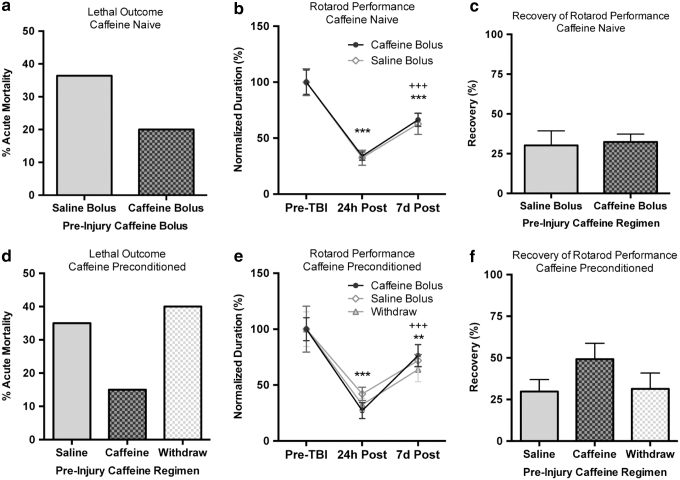FIG. 5.
Preinjury caffeine consumption patterns (including withdrawal) do not influence outcome after severe injury. (a) In caffeine-naive rats, a preinjury caffeine bolus (1 hour before FPI) does not significantly reduce acute mortality. (b) Motor function at 24 hours after severe FPI was significantly impaired when compared to baseline, preinjury function (***p < 0.001) in caffeine-naive rats. Rotarod performance was still impaired at 7 days after injury compared to baseline (***p < 0.001), but spontaneous recovery over the 24-hour time point was measured (+++p < 0.001). There was no significant difference between a 25 mg/kg caffeine bolus and saline. (c) Recovery of function at 7 days was not significantly influenced by the caffeine bolus in caffeine-naive rats. (d) In caffeine-preconditioned rats, a preinjury caffeine bolus (1 hour before FPI) does not significantly reduce acute mortality, and 36 hours of preinjury caffeine withdrawal have no influence on acute mortality. (e) Motor function at 24 hours after severe FPI was significantly impaired when compared to baseline, preinjury function (**p < 0.01, ***p < 0.001) in caffeine-preconditioned rats. Rotarod performance was still impaired at 7 days after injury compared to baseline (***p < 0.001), but spontaneous recovery over the 24-hour time point was measured (++p < 0.01). There was no significant influence of caffeine bolus or withdrawal. (f) Recovery of function at 7 days was not significantly influenced by the caffeine bolus or withdrawal in caffeine-preconditioned rats.

